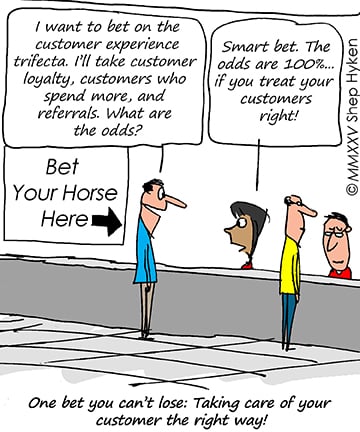 If you go to the horse race, you can place a bet known as the trifecta. This is where you correctly predict which horses will finish first, second, and third, and in the specific order. The payout is typically big because, while it’s simple in theory and easy to explain, it is a hard bet to win.
If you go to the horse race, you can place a bet known as the trifecta. This is where you correctly predict which horses will finish first, second, and third, and in the specific order. The payout is typically big because, while it’s simple in theory and easy to explain, it is a hard bet to win.
Here’s a bet you can always win: taking care of your customers. And when you do it right, you hit the trifecta:
- First, they come back.
- Second, customers who come back will typically spend more every time.
- Third, customers who come back also recommend you. We love it when customers do our advertising and marketing for us.
So, how can we define taking care of your customers? Here’s a simple definition:
Taking care of your customersmeans you consistently deliver on what they expect, and do it in a way that’s easy, respectful, and reliable every time.
So, let’s break down the important words within this definition:
- Consistently: The experience must be predictable and consistent. Consistency creates confidence. Confidence creates trust, and that leads to repeat business, and ideally and ultimately, customer loyalty.
- Expect: Customers want you to meet their expectations. If you consistently – there’s that word again – meet those expectations, you don’t leave your customers hoping for more. And once in a while, you can go “above and beyond” or “over the top” when the opportunity presents itself.
- Easy: This is about convenience. Customers love doing business with a company or brand that is easy and convenient. I wrote an entire book on this one, The Amazement Revolution.
- Respectful: In addition to treating customers with respect, also respect their time. Wasting someone’s time is a sign of disrespect.
- Reliable: This goes along with consistency and expectations. The product must do what the customer paid for it to do. No matter how good the service is, if the product doesn’t work, even the friendliest customer service won’t get customers to come back.
When a customer chooses to do business with you, there’s an implied agreement. They give you money in exchange for a product or service, and they expect you to take care of them as I’ve defined it. It may seem like common sense, and it is, but that doesn’t mean it’s easy to implement. You need all employees on board with this simple concept. Everyone must understand how they contribute to the concept of taking care of the customer. Do that, and you’re not gambling. You’re betting on a sure thing. You’ll hit the trifecta!







